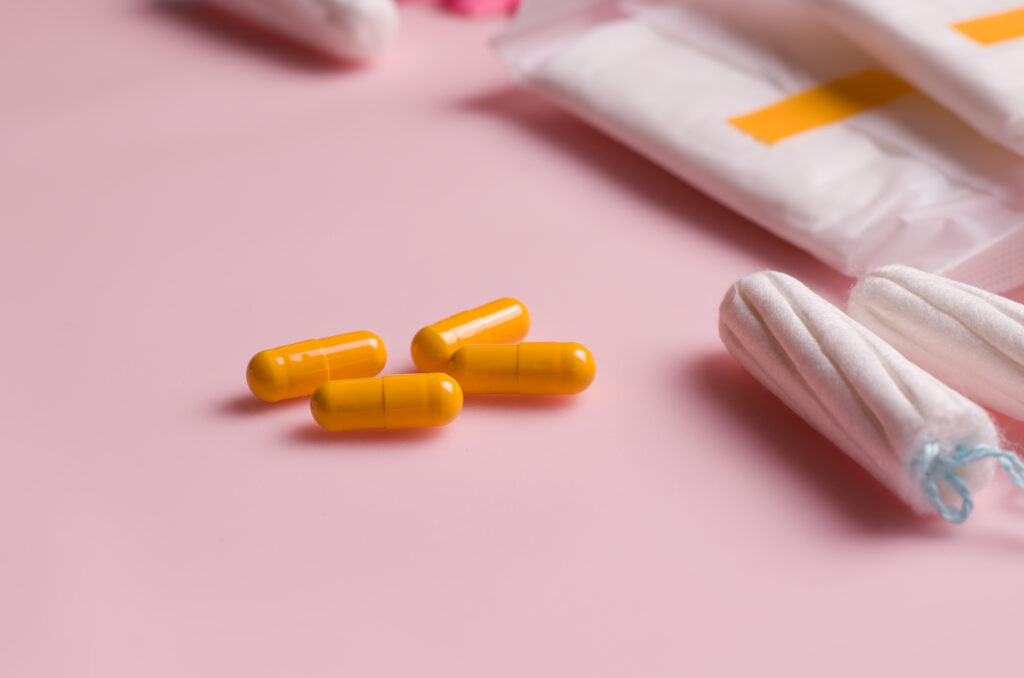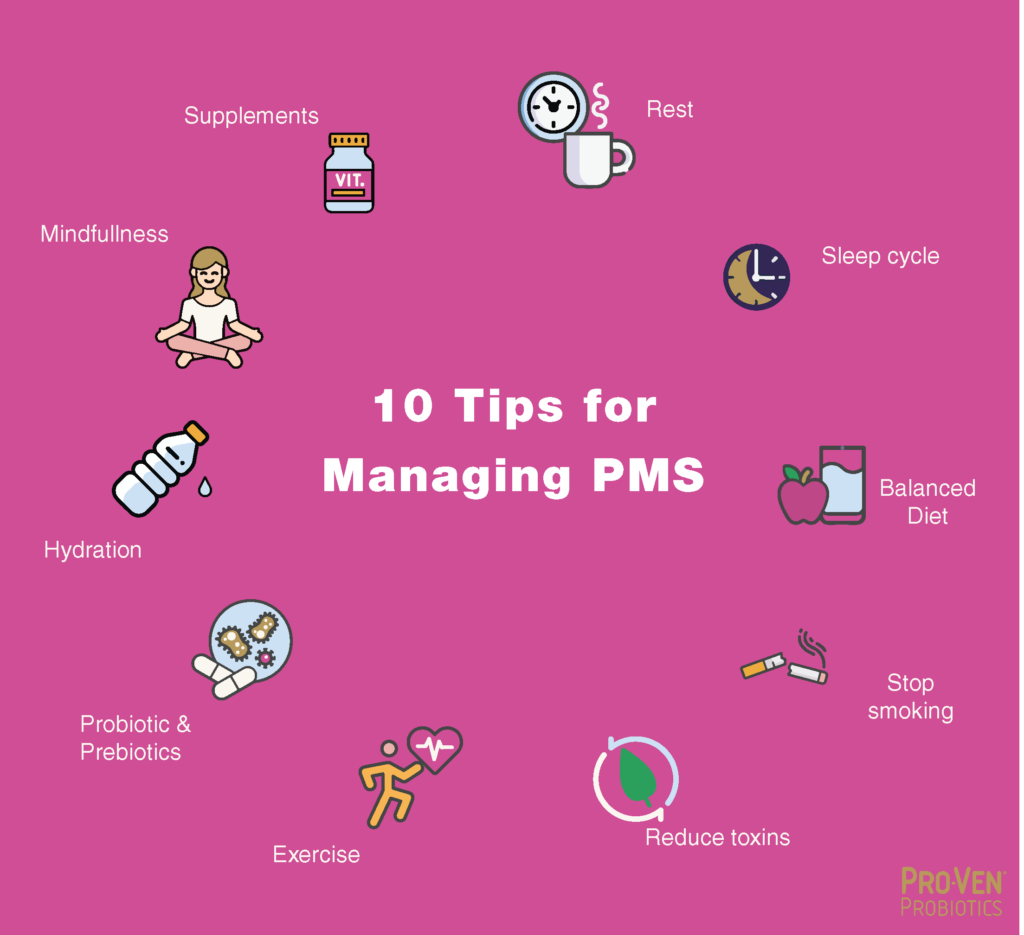- © 2018 - 2022 ProVen Probiotics. Cultech
- Contact Us
- Cookie Policy
- Privacy Policy
- Terms and Conditions
Probiotics for PMS and Periods
Probiotics for PMS and periods
We have seen a strong focus on women’s health over the past few years and increased discussion around PMS (premenstrual syndrome), menopause and vaginal health.
When people hear the word “probiotics,” they immediately think of the gut and possibly now also know that there is a link between the microbiome and the immune system – people are less familiar with the link between the gut microbiome, the vaginal microbiome and genital, urinary and hormonal health.
In this article, we will focus on the link between the gut microbiome and the menstrual cycle. We get many questions about the benefits of probiotics for periods – can they help with PMS? which is the right probiotic for me? do they interact with the menstrual cycle? are there any side effects? what should we look for when choosing a probiotic supplement? This article will answer these questions and more…
What is the menstruation cycle?
The menstrual or menstruation cycle has four phases that take place over a 28-day period (or slightly less or more, depending on the individual woman). It starts on the first day of your period and ends when the next period begins and includes menstruation, the follicular phase, ovulation and the luteal phase. These phases are controlled by the two female hormones, estrogen and progesterone, and occur in sequence as these hormones rise and fall throughout the month.

Menstruation – this is when the uterus lining sheds and a woman bleeds. It generally lasts between three and seven days each month.
The follicular phase – starts on the first day of the period and lasts for around 13-14 days, prior to ovulation. Once the period is finished, estrogen rises in preparation for an egg to be released and the lining of the uterus builds back up again.
Ovulation – estrogen peaks to signal to the ovary to release an egg.
The luteal phase – is the phase of 10-14 days between ovulation and the next period when estrogen remains high and progesterone rises as the body prepares for a potential pregnancy. If a pregnancy does not occur, estrogen and progesterone both drop and menstruation occurs. It is these hormonal changes that are thought to contribute to PMS symptoms during this luteal phase.
What is PMS?
Pre-menstrual syndrome (PMS) is the generic name given to the wide variety of symptoms that a woman may experience in the week(s) before her period. It is diagnosed based upon these symptoms occurring before a woman’s period and disappearing again after. Symptoms can occur up to two weeks before the period and usually disappear a couple of days after the period has started.
The symptoms can be both physical and emotional and are different for each individual woman. Some of the most common symptoms include mood changes (including irritability, anger, sadness and depression), sore or tender breasts, food cravings, fatigue, headaches, skin changes and acne, bloating and stomach cramps, tiredness and trouble sleeping.
They can also be more severe in some people than others, and it is estimated that around 5% of women suffer from a condition known as premenstrual dysphoric disorder (PMDD), which has a debilitating impact on mental health and can affect normal day-to-day life.

What causes PMS?
The specific causes of PMS are not clear. It is believed to be linked to the fall in hormones and how this impacts the neurotransmitters (chemicals) in the brain and particularly serotonin, which helps to regulate mood.
As serotonin is key in mood, insufficient amounts of serotonin may contribute to PMS, as well as to fatigue, sleep problems and food cravings. High levels of serotonin are also present in the gut, so fluctuations in this neurotransmitter may also affect digestive health.
Stress is also a major causative factor in PMS, as it interferes with sleep, affects blood sugar levels and hence food cravings, impacts energy and can lead to burnout,
Many say that PMS gets worse as we age. Whilst there is no proof for this, it is thought to be related to hormone changes that occur in perimenopause, which can start around 10 years before the onset of menopause (when a woman’s periods stop completely). It may also be related to increased levels of stress and decreased overall bodily capacity for hormone and neurotransmitter production, digestive health and overall energy production.
How can PMS be managed?
There is no ‘one size fits all’ method for managing PMS and, just like the symptoms, the most effective solutions will vary between women and include the following:

- Get plenty of rest both during the day and at night.
- Establish a regular sleep cycle and get eight hours of good quality sleep every night.
- Eat a balanced diet with lots of fruit and vegetables – and cut out the sugar, caffeine and alcohol.
- Stop smoking – this has been shown in studies to worsen PMS symptoms.
- Reduce exposure to toxins wherever possible.
- Exercise daily – try to do a few longer sessions 3-4 times a week and at least 15 minutes every day and include both aerobic and strength exercises.
- Yoga, meditation, massage, and breathing exercises can also help – particularly with pain and feelings of stress.
- Stay hydrated at all times, ensuring that you never feel thirsty.
- Include a probiotic supplement and probiotic and prebiotic foods in your daily routine (this is where we come in – more details below).
- Consider other supplements, including magnesium, omega-3 oils, evening primrose oil and B vitamins (particularly B6).
What are probiotics?
Probiotics are live bacteria that, when administered in adequate amounts, provide a health benefit to the host via their ability to modify the intestinal microbiota. They act as proxies (substitutes) for the bacteria that live in our intestines and are found in both foods and supplements. Some probiotics come from human sources, whilst others are cultured from foods.
Probiotics and PMS
As well as having a crucial role in nutrient absorption, vitamin production, energy metabolism and immunity, the gut microbiome has a number of specific roles in relation to the regulation of hormone and neurotransmitter production. Certain species of gut bacteria influence the levels of estrogen circulating in the body and ensuring a diverse microbiome helps to support all bodily activities including detoxification and elimination.
Here are the answers to some of the common questions we mentioned above:
- Is it OK to take probiotics while I have my period?
Taking probiotics during your period may help to reduce bloating and ease digestive discomfort, rebalancing the microbiome and helping to normalize stools, so reducing constipation and diarrhea. We would recommend including probiotics in your diet throughout the month for maintenance and potentially increasing intake immediately prior to and during your period.
- What are the benefits of probiotics in relation to menstruation?
Probiotics have been shown to have a wide variety of benefits, many of which may be particularly useful in helping to prevent PMS and other period-related symptoms. These include (but are not restricted to) reducing digestive issues, supporting energy production, helping to maintain balance in general health, supporting detoxification and elimination and helping to balance mood and stress levels.
- Do probiotics help with hormonal balance?
The bacteria in our microbiome interact directly with our endocrine system, which is the hormone system that regulates the body’s biological processes and includes all sex hormones, including estrogen and progesterone. One of the key functions of the microbiome in relation to sex hormones is the role certain bacteria strains have in helping to regulate and metabolize estrogen, making sure estrogen levels are balanced in relation to the levels of progesterone.
As a result, eating probiotic-rich foods and taking a high-quality probiotic supplement to help support a balanced and diverse microbiome may also support hormonal balance.

- Should I take probiotics throughout my menstrual cycle?
Yes – we recommend eating probiotic-rich foods, prebiotic foods (onions, garlic, leeks, artichokes) that feed the good bacteria and a good quality probiotic supplement throughout the month to support both gut and hormone balance.
ProVen Probiotics For Women is a one-a-day supplement designed specifically for women, that contains 17.5 specific probiotic bacteria per capsule with cranberry and vitamin B6 and is designed to be taken throughout the month. Some women may choose to take two capsules a day immediately prior to or during their period for additional support. The capsules can be taken indefinitely, but we recommend focusing on the dietary and lifestyle changes mentioned above alongside taking the probiotics and reassessing the need for the supplement after 12 weeks.
- How do I know which probiotic supplement is right for me?
When choosing a probiotic always look for the following characteristics:
- Multi strain – do the supplements contain multiple strains of bacteria to help support microbial diversity?
- Strain numbers – does the product packaging include clearly defined strain numbers?
- CFU numbers – how many viable bacteria cells does each capsule contain?
- Research – is the product and/or the bacteria strains it contains supported by clinical studies?
- Current good manufacturing practices (GMP) – are the supplements manufactured to approved GMP standards?
- Human origin – are the strains originally isolated from humans?
- Resistance to stomach acid, bile and pancreatic secretions (enzymes) – is there evidence that the bacteria pass through the gut alive?
- Survival at room temperature – modern technological capabilities mean that probiotic supplements no longer require refrigeration.
- Achieve the guaranteed shelf life – are the bacteria numbers guaranteed to the product expiry date?
- Additional ingredients – does the product contain other nutrients that are beneficial to my needs?
Be aware of how you feel before you start taking the probiotic and monitor any changes or side effects. Some people experience additional bloating when they start taking probiotic supplements and they start to have an effect, but this usually subsides within a week or so.

If you would like any additional information, please reach out to us via email at [email protected]

 Available from the 8th March to the 19th March on our three most popular women’s probiotics.
Available from the 8th March to the 19th March on our three most popular women’s probiotics.  Discount added automatically at checkout for you.
Discount added automatically at checkout for you. 